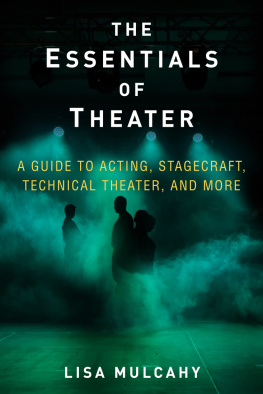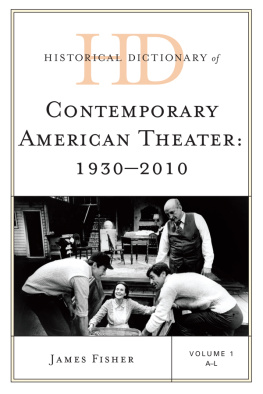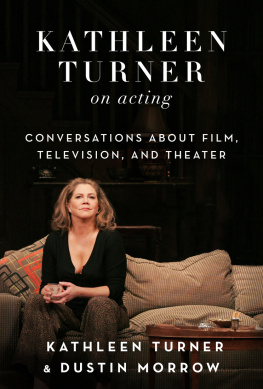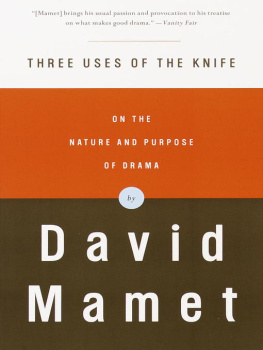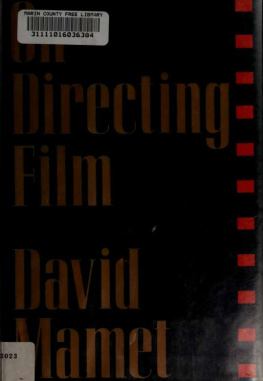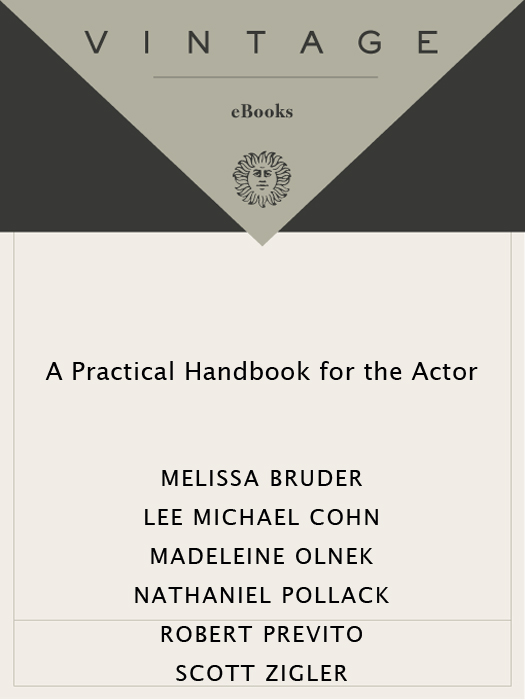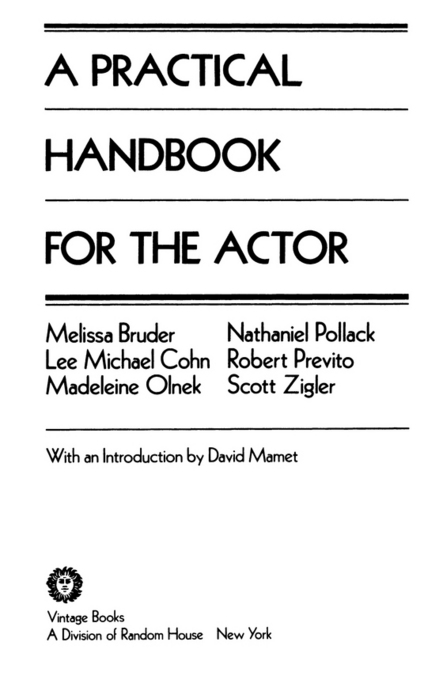A Vintage Original, May 1986
Copyright 1986 by Melissa Bruder, Lee Michael Cohn, Madeleine Olnek, Nathaniel Pollack, Robert Previto, Scott Zigler.
All rights reserved under International and Pan-American Copyright Conventions. Published in the United States by Random House, Inc., New York, and simultaneously in Canada by Random House of Canada Limited, Toronto.
The extract from A Streetcar Named Desire, by Tennessee Williams, is reprinted by permission of the Lantz Office. Copyright 1947 by Tennessee Williams; copyright renewed 1974 by Tennessee Williams.
Library of Congress Cataloging-in-Publication Data
A Practical handbook for the actor.
A Vintage originalT.p. verso.
1. Stanislavsky method. 2. Acting. I. Bruder, Melissa.
PN2062.P73 1986 792.028 85-40875
eISBN: 978-0-307-49913-4
v3.1
This book is dedicated to W. H. Macy and David Mamet.
Always tell the truth. Its the easiest thing to remember.
Contents
Introduction
Most acting training is based on shame and guilt. If you have studied acting, you have been asked to do exercises you didnt understand, and when you did them, as your teacher adjudged, badly, you submitted guiltily to the criticism. You have also been asked to do exercises you did understand, but whose application to the craft of acting escaped you, and you were ashamed to ask that their usefulness be explained.
As you did these exercises it seemed that everyone around you understood their purpose but youso, guiltily, you learned to pretend. You learned to pretend to smell the coffee when doing sensory exercises. You learned to pretend that the mirror exercise was demanding, and that doing it well would somehow make you more attuned on stage. You learned to pretend to hear the music with your toes, and to use the space.
As you went from one class to the next and from one teacher to the next, two things happened: being human, your need to believe asserted itself. You were loath to believe your teachers were frauds, so you began to believe that you yourself were a fraud. This contempt for yourself became contempt for all those who did not share the particular bent of your school of training.
While keeping up an outward show of perpetual study, you began to believe that no actual, practicable technique of acting existed, and this was the only possible belief supported by the evidence.
Now how do I know these things about you? I know them because I suffered them myself. I suffered them as a longtime student of acting, and as an actor. I suffer them second hand as a teacher of acting, as a director, and as a playwright.
I know that you are dedicated and eagereager to learn, eager to believe, eager to find a way to bring that art that you feel in yourself to the stage. You are legitimately willing to sacrifice, and you think that the sacrifice required of you is subjugation to the will of a teacher. But a more exacting sacrifice is required: you must follow the dictates of your common sense.
It would be fine if there were many great master teachers of acting, but there are not. Most acting teachers, unfortunately, are frauds, and they rely on your complicity to survive. This not only deprives you of positive training but stifles your greatest gift as an artist: your sense of truth. It is this sense of truth, a simplicity, and feelings of wonder and reverenceall of which you possessthat will revitalize the Theatre. How do you translate them onto the Stage?
This book offers some wonderful, simple advice and suggestions. It is the best book on acting written in the last twenty years. The technical suggestions, finally, are reducible to a simple stoic philosophy: be what you wish to seem.
Stanislavsky once wrote that you should play well or badly, but play truly. It is not up to you whether your performance will be brilliantall that is under your control is your intention. It is not under your control whether your career will be brilliantall that is under your control is your intention.
If you intend to manipulate, to show, to impress, you may experience mild suffering and pleasant triumphs. If you intend to follow the truth you feel in yourselfto follow your common sense, and force your will to serve you in the quest for discipline and simplicityyou will subject yourself to profound despair, loneliness, and constant self-doubt. And if you persevere, the Theatre, which you are learning to serve, will grace you, now and then, with the greatest exhilaration it is possible to know.
David Mamet
Cabot, Vermont
1985
Authors Note
This book originally evolved from an exercise assigned to us by David Mamet during his summer acting workshop in Montpelier, Vermont, in 1984. The major portion of the text was gleaned from notes taken in Davids and W. H. Macys acting classes during summer workshops in 1983 and 1984 and during the New York University fall and winter sessions in New York and at the Goodman Theatre in Chicago. The Practical Aesthetics Workshop, as the group is officially known, came together under the auspices of New York University and was organized purely as a one-shot summer program. That the workshop has continued for over two years is a testament to the dedication of the teachers and students alike. The final fruit of our study has been the formation of the Atlantic Theatre Company, a company whose members are almost all Practical Aesthetics Workshop alumni.
The authors would like to thank the following individuals for their support and encouragement: Lindsay Crouse, Derek Johns, Bill Macy, David Mamet, Evangeline Morphos, Gregory Mosher, Robin Speilberg and Linda Miller (typists extraordinaire), Andrew Wylie, and all the members, past and present, of the Atlantic Theatre Company.
Melissa Bruder
Lee Michael Cohn
Madeleine Olnek
Nathaniel Pollack
Robert Previto
Scott Zigler
Vermont
1985

The Job of the Actor

J. D. Salinger once said, You were a reader before you were a writer. By the same token, all actors started out as audience members. What were the first things that struck us about the theatre? What are the things that draw us to the theatre again and again? What creates those moments that every audience member has had of sitting up in his chair because something has struck him in the gut? These moments are under no one persons control; their creation is shared in equally by audience, actor, director, and technician. Realizing this, the actor must understand that it is not rational to say, It is my job to create these magical moments. Instead, he should realize that all he can do is bring himself to the theatre in optimum condition to participate in the play at hand. Identifying what things he can do to put himself in optimum condition and then doing them consistently so that they become habitual to him will give the actor the satisfaction of always knowing what to do, what his job truly is.


![Viola Spolin - Improvisation for the Theater: A Handbook of Teaching and Directing Techniques [1963 ed.]](/uploads/posts/book/406435/thumbs/viola-spolin-improvisation-for-the-theater-a.jpg)
